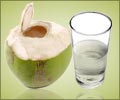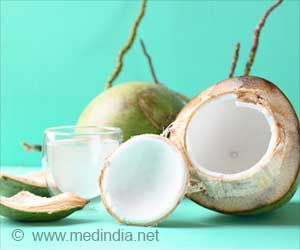Who says coconut water is just for summer? Discover its surprising winter benefits for hydration, skin health, and more!

- Coconut water is a hydrating, low-calorie drink rich in nutrients and antioxidants, perfect for winter health and skin
- It helps regulate blood pressure, boosts energy, and supports digestive health with its natural electrolytes and potassium
- Coconut water’s anti-inflammatory and antioxidant properties combat free radicals, keeping your immune system strong during colder months
Health Benefits of Drinking Coconut Water in Winter
Hydration:
Staying hydrated is critical in the chilly weather too. Tender coconut water is a great way to stay hydrated. Achieve your hydration goals with a glass of tender coconut water. Clinically, patients experiencing severe dehydration from diarrhea may benefit from using coconut water as an oral rehydration therapy to replenish fluid lost from the gastrointestinal system (1✔ ✔Trusted SourceComparison of coconut water and a carbohydrate-electrolyte sport drink on measures of hydration and physical performance in exercise-trained men
Go to source).
Coconut water's natural electrolytes make it an effective post-workout drink- even in winter! It hydrates without the calories of sugary drinks. #winterwellness #coconutwater #medindia’
Digestive health:
Coconut water is high in potassium, has anti-inflammatory properties and can influence the gut microbiota. Modification of the gut microbiota improves ulcerative colitis (UC) results, and potassium has anti-inflammatory properties in vitro. When it came to causing clinical remission in people with mild to moderate UC, coconut water worked better than a placebo (2✔ ✔Trusted SourceCoconut Water Induces Clinical Remission in Mild to Moderate Ulcerative Colitis: Double-blind Placebo-controlled Trial
Go to source).
Electrolyte Balance:
It contains electrolytes like potassium and sodium, which help to balance fluids in the body. This is especially important during the winter months when it's easy to dehydrate. After workouts, you can use coconut water to rehydrate your entire body. Compared to other beverages, it is easier to consume in greater quantities, has a sweeter taste, and produces less nausea and fullness (1✔ ✔Trusted SourceComparison of coconut water and a carbohydrate-electrolyte sport drink on measures of hydration and physical performance in exercise-trained men
Go to source).
Supports Skin Health:
Staying hydrated with gentle coconut water will help keep your skin moisturized and shining, combatting the dryness that frequently occurs over the winter. Kinetin, a phytohormone found in coconut water, has antioxidant and anti-aging properties (3✔ ✔Trusted SourceThe chemical composition and biological properties of coconut (Cocos nucifera L.) water
Go to source).
Low in Calories:
If you are managing your calorie intake over the holidays, coconut water is the perfect low-calorie drink that will quench your thirst without adding extra calories. Coconut water is not only easier to absorb but it has fewer calories than any juice or soft drink brand (4✔ ✔Trusted SourceElectrolytes, sugar, calories, osmolarity and pH of beverages and coconut water
Go to source).
Natural Energy Booster:
If you feel tired during the winter months, the natural sugars and electrolytes in coconut water can help you feel more energized.Regulates Blood Pressure:
Coconut water regulates blood pressure and promotes heart health, making it an ideal choice for the winter months. A 2024 study revealed that consuming tender coconut water daily for a week reduced blood pressure in hypertensive patients (5✔ ✔Trusted SourceThe Effect of Young Coconut Water on Blood Pressure in Hypertensive Patients
Go to source).
Antioxidant Properties:
Coconut water is rich in antioxidants and combats free radicals in the body. This is especially important during winter as performing a physical activity like exercise or outdoor sports in cold conditions increases free radical production (6✔ ✔Trusted SourceCold exposure increases exercise-induced oxidative stress
Go to source). The presence of environmentally persistent free radicals (EPFR) and reactive oxygen species (ROS) is also higher in the winter than in summer (7✔ ✔Trusted Source
Characteristics and Risk Assessment of Environmentally Persistent Free Radicals (EPFRs) of PM2.5 in Lahore, Pakistan
Go to source).
Nutrient-Rich:
Coconut water is high in nutrients, which help to boost your immune system during the cold and flu season. Coconut water's potassium concentration is beneficial to heart health (8✔ ✔Trusted SourceCoconut Water: A Sports Drink Alternative?
Go to source).
Therefore, coconut water is a versatile supplement to your winter diet, not just a drink. It is ideal for any dietary requirement and can be used as a foundation for winter soups. During the colder months, it's a tasty and nourishing approach to maintain your general health and well-being. You can be sure you are choosing something reassuring and healthful for this winter with all these special advantages.
References:
- Comparison of coconut water and a carbohydrate-electrolyte sport drink on measures of hydration and physical performance in exercise-trained men - (https://pubmed.ncbi.nlm.nih.gov/22257640/)
- Coconut Water Induces Clinical Remission in Mild to Moderate Ulcerative Colitis: Double-blind Placebo-controlled Trial - (https://pubmed.ncbi.nlm.nih.gov/38278200/)
- The chemical composition and biological properties of coconut (Cocos nucifera L.) water - (https://pubmed.ncbi.nlm.nih.gov/20032881/)
- Electrolytes, sugar, calories, osmolarity and pH of beverages and coconut water - (https://pubmed.ncbi.nlm.nih.gov/7163850/)
- The Effect of Young Coconut Water on Blood Pressure in Hypertensive Patients - (https://pubmed.ncbi.nlm.nih.gov/39221800/)
- Cold exposure increases exercise-induced oxidative stress - (https://pubmed.ncbi.nlm.nih.gov/21681166/)
- Characteristics and Risk Assessment of Environmentally Persistent Free Radicals (EPFRs) of PM2.5 in Lahore, Pakistan - (https://pubmed.ncbi.nlm.nih.gov/36767750/)
- Coconut Water: A Sports Drink Alternative? - (https://pmc.ncbi.nlm.nih.gov/articles/PMC10534364/)
Source-Medindia















